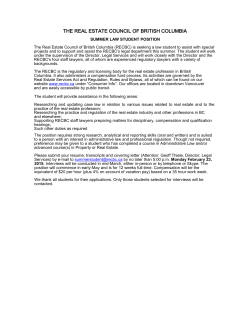
SF Bay vs. Minneapolis: The Real Difference in Cost of Living
SF Bay vs. Minneapolis: The Real Difference in Cost of Living Most people expect that moving to the midwest means a steep reduction in almost all living expenses; but I’ve found this to be quite incorrect. The reason? A strong psychological tendency to upgrade one’s lifestyle and, hence, their cost of living. It just goes to show you that people behave quite differently than one would expect based on a purely financial observation. I can tell you from my own personal experience with relocating that the only two things that are notably less expensive are real estate and perunit energy costs. Granted, these two factors can have a huge impact if you consider how large a percentage each may consume in the average household’s budget. But if you examine people’s actual expenditures and correct for a reduced income, the savings advantage shrinks dramatically. Real Estate I estimate that the price of real estate here in Minneapolis is about onethird to onequarter less expensive than it is in Berkeley. Unfortunately for renters, the savings don’t translate as equally. My guess is that rent is only onethird to half as much as Berkeley which favors owning realestate and renting to others in Minnesota where possible. This one factor has a tremendous impact considering that most people devote about a third of their budget to this. Most people I’ve spoken with who have made a West Coast move have taken the opportunity to increase the size of their quarters so they’re not fully enjoying the savings discussed above but will nevertheless see an increase in space for less money. Energy Energy is not so easy to compare. As mentioned previously, the per unit costs are lower but your usage will vary substantially from your West Coast experience. Gasoline is about 25% cheaper, heating fuels are cheaper but you need a lot more and general household energy use is higher but only because you’re likely to have greater square footage. On thing that can really make a difference to your transportation energy budget is your commute. The distance of which is again affected by real estate prices. For us, we have dramatically shorter commutes (in fact, we both ride our bikes when it’s above 40 degrees) resulting in about $2500 of annual gas savings (this was before the major price declines of Q42014). Perhaps the surprising finding from this analysis is that our total out of pocket costs for real estate have in fact increased but our value for money is much better. In August of 2014, the rent in Berkeley on our 800 square foot, one bedroom apartment was $1,995 a month, including electricity and utilities. Add $40 for renter’s insurance and our allin was $2,035. Let’s compare the cost of that to our 3bedroom, 2,300 square foot house, with landscaped garden and koi pond. Including the mortgage, property taxes, _____________________________________________________________________________________________ Wealth Strategies for Creative, Entrepreneurial and Strategic Business Owners Twin Cities & Bay Area T: (888) 544 3250 E: ashley@aretews.com URL: aretews.com @aretewealth 1 homeowners insurance, electricity, gas, utilities, landscaping and maintenance and we’re actually paying $121 a month more! Overall, we’re getting much better value for money and are building equity in the property. A recent Economist article goes a long way to explaining this difference in value for money. They postulate that in high growth economic areas such as the Bay Area, redtape and a NIMBY attitude, increase the price of real estate significantly. An alternate way of viewing the higher Real Estate prices in such places as the Bay Area are that they’re simply economic rents accruing to landlords, which of course is further exaggerated by the distorting effects of Prop 13 . _____________________________________________________________________________________________ Wealth Strategies for Creative, Entrepreneurial and Strategic Business Owners Twin Cities & Bay Area T: (888) 544 3250 E: ashley@aretews.com URL: aretews.com @aretewealth 2
© Copyright 2025











